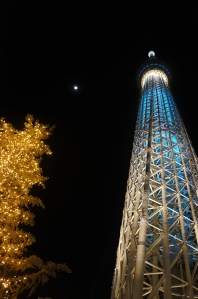What the Japanese Deem Romantic
Japan and the Moon
 K and I were walking through the streets of Beijing. We were with a loud, rowdy mix of foreigners and Chinese, and the feeling of summer was fresh in the air. The district we just passed through was famous for Sichuan cuisine and outdoor eating. The whole road was lined with red lanterns and hundreds of tables on the sidewalk, each filled to the brim with steaming hot fish, boiling red pepper hot pot or stir fried vegetables and meat. The floor was littered in peanut and sunflower seed shells, the official snacks of China. The street was loud, but in a good way, the way that makes a city feel alive. Whole.
K and I were walking through the streets of Beijing. We were with a loud, rowdy mix of foreigners and Chinese, and the feeling of summer was fresh in the air. The district we just passed through was famous for Sichuan cuisine and outdoor eating. The whole road was lined with red lanterns and hundreds of tables on the sidewalk, each filled to the brim with steaming hot fish, boiling red pepper hot pot or stir fried vegetables and meat. The floor was littered in peanut and sunflower seed shells, the official snacks of China. The street was loud, but in a good way, the way that makes a city feel alive. Whole.
Half drunk and full of energy, I look up to the sky and cry: “Wow, look at the moon! It’s full! It’s so beautiful!”
K looks up and then back to me, “You know what surprised me the most about Chinese people? How they link the moon and romance. I mean, how can you think the moon is romantic?”
My brain took a few seconds to process said words before realizing that I was experiencing Japanese culture shock in Beijing.
“In the west we think the moon is romantic, too” I replied. “There’s so many poems and stories about the moon. There’s even a song called moonlight lovers or something, isn’t there?”
K’s brain seemed to explode as well upon hearing said sentence.
“No way. Americans think the moon is romantic, too? That is beyond strange.”
“Of course it’s romantic! It’s so mystical, so beautiful—if the moon isn’t romantic, then what is?”
“Depends on the person, doesn’t it?” He replied back.
“Yeah, but there’s always a typical symbol of romance in every culture. Like the rose, that’s romantic, right? You send it to a lady you fancy.”
“I think in Japan it’s different.”
“Then what is the standard symbol of romance in Japan?”
“I don’t know, it depends on that person. In Japan we don’t directly communicate feelings like that, so a symbol of romance could be portrayed in the way we touch somebody. The way someone prepares our favorite drink, or what shirt they wear, or even their perfume. A certain word that two people share, or even a place, can evoke romance.”
“Man, that’s just too Japanese” I sigh. “You sound like a Murakami book or something.”
“In Japan, we prefer the indirect, the not so obvious, the little gestures and detail that are hard to notice. That’s what we consider romantic. You guys and the moon, it’s just too much.”
American women may want to be serenaded under the moonlight while holding a bouquet of roses–but a Japanese woman, on the other hand, would find the same act of romance embarrassing or awkward.
I looked up to the moon and smiled. I must still be American at heart, because there is something special about that beaming circle in the sky.
In Japan, One is not the Loneliest Number
 “Japanese people are a strange ethnic group. They like to be alone” K said over coffee.
“Japanese people are a strange ethnic group. They like to be alone” K said over coffee.
“Yeah, I realized that. I used to enjoy being around people and found it hard to do things by myself, like have dinner or coffee, but after living in Japan for two years I gradually liked to do things alone.”
We were in a Starbucks in Wangfujing, Beijing. The weather was pleasant, although a bit hot. I was sipping on a coffee frappuccino, K was guzzling away at his caramel frappuccino.
“I don’t think I’ve had one of these since high school,” he commented to me.
“What? No wonder you’re missing out on life,” I took another sip. “Frappucinos in summer are a godsend.”
I was pretty hungover. My head was pounding and I probably looked like a truck hit me. I was functioning on 2 shots of vodka, a shot of whiskey, 5 cans of beer and 4 hours of sleep. K and I had just climbed the observation park that looked over the forbidden city. Even looking at the forbidden city left me tired and dull. I wanted to sleep.
“You’ve gotten weaker, Mary, getting hungover so easily,” K shakes his head at me. I can’t help but agree.
“I know. I’ll never be your equal,” I sigh.
I took another sip of my drink then returned to the previous topic.
“Japanese people really are weird. For example, I had a Japanese roommate in university. There were 3 of us living in one apartment and we were all really close friends. We always partied on the weekends together or met up for lunch on campus. It was a Sunday afternoon and we were all lounging around. Suddenly Miho gets ready to go out and without a peep, leaves. My friend and I figured she had plans so the two of us just stayed home. When she came back 3 hours later, we asked
‘where did you go?’
‘the movies’ she said.
‘who did you go with?’
‘I went alone’
My friend and I literally sprung from the couch and screamed, ‘WHAT!? We were all sitting around all day doing nothing, why didn’t you invite us!?’
She merely shrugged, apologized, and said she’d invite us next time.
“Well that’s normal to me,” K said without a blink as I finished my story. “Sometimes you just want to be alone.”
“But going to a movie alone is just so… lonely,” I cringed. “It’s equivalent to going to yakiniku by yourself.”
“Really?” K’s eyes widened in shock. “In Japan people go to the movies alone a lot. It’s how they reflect. Japanese people just love to do stuff alone. Like come to Starbucks,” he looked around.
I went back to my Japanese-roommate story, unsatisfied with his answer.
“I was also annoyed because that Japanese friend never asked us out to do things. We always invited her to parties, shopping, dates, etc… but in the 2 years I knew her she never asked me to do anything.”
“Well Mary, that can easily be explained,” K set down his drink. “In Japan, there’s two types of people: The inviters and the invitees.”
“Don’t tell me it’s really that clear cut.”
“It is. Invitees will NEVER ask you to go out. Ever. Even if you know them for ten years, they will always expect you to invite them out. They are extremely passive.
Then you have the inviters. They’re always going to ask you to go do stuff. Want to go to a movie? Want to go to dinner? Drinking? This party? Like everything in Japan, these roles are assigned—maybe not in writing, but definitely indirectly. If we didn’t have clear, definitive roles like this, then people would never meet up and go out.”
“So what are you?”
“Definitely an inviter. Duh. Or else we wouldn’t be friends.”
“I invite you to do stuff!” I cry.
He smacks me on the head with a smile, “yeah, to go out drinking. You hungover drunk.”
Farewells Are Far Too Hard
 K and I had a blast in Beijing with my friend Shu, and we created some damn good memories (despite being drunk and hungover and spending ten hours in a train).
K and I had a blast in Beijing with my friend Shu, and we created some damn good memories (despite being drunk and hungover and spending ten hours in a train).
K will be leaving Shanghai next week to ‘move on.’ It’s time to go back to Japan, get a job, save up money, get married, buy a house and have kids. I wonder when I’m going to hit that stage.
Still, farewells are bitter, especially with K. We came to Shanghai together, experienced Shanghai turmoil together, and succeeded in this city both career-wise and linguistically through hard work and dedication. To me, Shanghai is K and K is Shanghai. I’ll miss him terribly, and the thought of him leaving hurts me.
Although we won’t be eternally separated (we all know I’ll be going back to Japan, and he’ll be back in Shanghai sooner than later), it’s the ending of an era that makes me sad. The Shanghai life of K and I drinking, eating, wandering the streets, crying, laughing, and experiencing life to the fullest—it will be gone.
I rarely connect with Japanese people, despite being a Japanese major and living there for years. It was a shock for me to meet K. I could be my 100% self around him, and he was ok with that. He wasn’t phased by how direct I was, nor did he care about how I might offend his Japanese culture. He was open minded in every sense of the word, and he wasn’t afraid to challenge my ideals, or vice versa.
In other words, I finally met a Japanese person that I can call a best friend.
Goodbye, K. Shanghai and I will miss you.